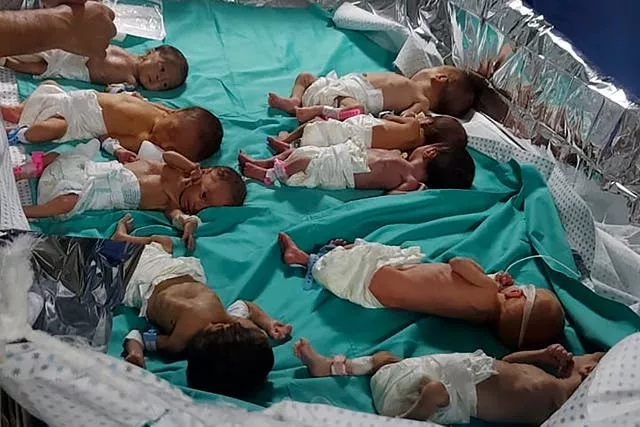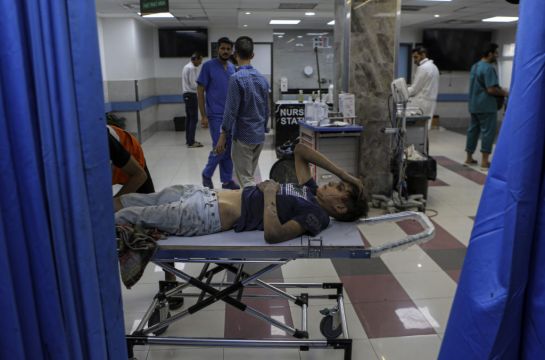Another 200,000 people have fled northern Gaza since November 5, the UN humanitarian office said on Tuesday, as Israeli ground forces battle Palestinian militants around hospitals where patients, newborn babies and medics are stranded with no electricity and dwindling supplies.
The humanitarian office, known as Ocha, said only one hospital in the north is capable of receiving patients.
All the others are no longer able to function and mostly serve as shelters from the fighting, including Gaza’s largest, Shifa, which is surrounded by Israeli troops and where 36 babies are at risk of dying because there is no power for incubators.

The war, now in its sixth week, was triggered by Hamas’s surprise October 7 attack on Israel, in which militants massacred hundreds of civilians and dragged some 240 hostages back to Gaza.
Israel launched heavy air strikes for nearly three weeks before sending troops and tanks into the north.
The war has killed thousands of Palestinian civilians and wreaked widespread destruction on the impoverished coastal enclave.
Israel has urged civilians to evacuate Gaza City and surrounding areas in the north, but the southern part of the besieged territory is not much safer.
Israel carries out frequent air strikes from north to south, hitting what it says are militant targets but often killing women and children.
UN-run shelters in the south are severely overcrowded, with an average of one toilet for 160 people. In all, some 1.5 million Palestinians – more than two-thirds of Gaza’s population – have fled their homes.
People stand in line for hours for scarce bread and brackish water. Rubbish is piling up, sewage is flooding the streets and taps run dry because there is no fuel for water pumps or treatment plants.

Israel has barred fuel imports since the start of the war, saying Hamas would use it for military purposes.
The UN agency for Palestinian refugees, which is struggling to provide basic services to more than 600,000 people sheltering in schools and other facilities in the south, said it may run out of fuel by Wednesday, forcing it to halt most aid operations.
It said it is unable to continue importing limited supplies of food and medicine through Egypt’s Rafah crossing, Gaza’s only link to the outside world.
With Israeli forces fighting Palestinian militants in the centre of Gaza City, the territory’s main city, both sides have seized on the plight of hospitals. Images of doctors trying to keep newborn babies warm at Shifa have been widely circulated.
Israel accuses Hamas of using hospitals as cover for its fighters, alleging that Hamas has set up its main command centre in and beneath Shifa, without providing visual evidence. Both Hamas and Shifa Hospital staff deny the Israeli allegations.
On Monday, the military released footage of a children’s hospital that its forces entered over the weekend, showing weapons it said it found inside, as well as rooms in the basement where it believes the militants were holding hostages.
“Hamas uses hospitals as an instrument of war,” said Rear Admiral Daniel Hagari, the army’s chief spokesman, standing in a room of the Rantisi Children’s Hospital decorated with a colourful children’s drawing of a tree. Explosive vests, grenades and RPGs were displayed on the floor.
Meanwhile, gunfire and explosions raged around Shifa, which Israeli troops encircled over the weekend. Tens of thousands of people have fled the hospital in the past few days and headed to the southern Gaza Strip, including large numbers of displaced people who had taken shelter there.

For weeks, Shifa staff members running low on supplies have performed surgery on war-wounded patients, including children, without anaesthesia and using vinegar as antiseptic.
After the weekend’s mass exodus, about 650 patients and 500 staff remain in the hospital, which can no longer function, along with around 2,500 displaced Palestinians sheltering inside with little food or water.
The Health Ministry in Hamas-ruled Gaza said 32 patients, including three babies, have died since its emergency generator ran out of fuel on Saturday. It said 36 babies, as well as other patients, are at risk of dying because life-saving equipment cannot function.
Early on Tuesday, the Israeli military said in a statement that it has started an effort to transfer incubators from Israel to Shifa. It was not clear if the incubators have been delivered or how they will be powered.
International law gives hospitals special protections during war. Hospitals can lose those protections if combatants use them to hide fighters or store weapons, but staff and patients must be given plenty of warning to evacuate, and the harm to civilians cannot be disproportionate to the military objective.
The International Committee of the Red Cross tried on Monday to evacuate some 6,000 patients, staff and displaced people from another Gaza City hospital, Al-Quds. But the Red Cross said its convoy had to turn back because of shelling and fighting.
Israel released a video showing what it said was a militant with a rocket-propelled grenade launcher entering Al-Quds Hospital. An Israeli tank was stationed nearby.

The US has pushed for temporary pauses to allow wider distribution of badly-needed aid. Israel has agreed only to daily windows during which civilians can flee northern Gaza on foot along two main roads.
As of last Friday, more than 11,000 Palestinians, two-thirds of them women and minors, have been killed since the war began, according to the Health Ministry in Gaza, which does not differentiate between civilian and militant deaths. About 2,700 people have been reported missing.
Health officials have not updated the toll, citing the difficulty of collecting information.
At least 1,200 people have died on the Israeli side, mostly civilians killed in the initial Hamas attack. The military says 46 soldiers have been killed in ground operations in Gaza, and that thousands of militants have been killed.
About 250,000 Israelis have evacuated from communities near Gaza, where Palestinian militants still fire barrages of rockets, and along the northern border, where Israel and Lebanon’s Hezbollah militant group have repeatedly traded fire since the start of the war.







